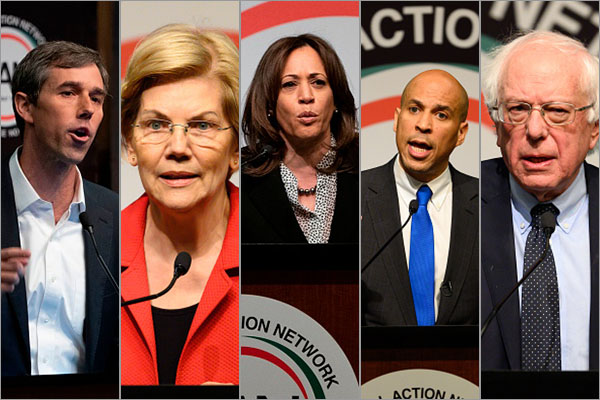Vice President Stacey Abrams? She'd Be 'Honored' To Be Considered
Stacey Abrams Says She’d Be ‘Honored’ To Be Considered For Vice President
Stacey Abrams said Thursday that she would be “honored” to be considered to be the Democratic nominee’s vice presidential running mate, according to a new report. It seemed to be the first time she suggested that she would welcome the opportunity to be on the Democratic ticket after repeatedly shooting down questions about her future.
Washington Post reporter Vanessa Williams tweeted about the conversation Abrams was having with legendary journalist Dorothy Gilliam at the Metropolitan A.M.E. Church in Northwest Washington Thursday evening. The report came on the backdrop of the annual Congressional Black Caucus Legislative Conference and was tweeted moments before the third Democratic debate began Thursday night.
Abrams, a rising star within the Democratic Party, had previously ruled out a run for president and recently said she had no interest in being a candidate to fill the seat of retiring Georgia Republican Sen. Johnny Isakson. She tweeted from her account late last month a statement attributed to her spokesperson that said in part “she will not be a candidate” in Georgia’s upcoming special election.
But just two weeks earlier, that same spokesperson,
Abrams has been all consumed with ending voter suppression, the same evil force that successfully plotted to prevent her from becoming the nation’s first Black woman governor. After conceding the election in November, she resumed her crucial role with Fair Fight Action, the voting advocacy group that works to ensure “free and fair elections.”
Abrams was the victim of one of the more overt cases of racist voter suppression in recent history. Abrams was running against Brian Kemp, who, at the time, was also the secretary of state, a position which just happens to oversee elections. The clear conflict of interest manifested itself in what was called “dirty tricks” on election day that included everything from missing power cords for voting machines to long lines delayed by more than four hours to polling places without an adequate number of voting machines.
As a result, Abrams said she believed the election was “stolen” from Georgia voters. That belief was clearly reason enough for her to stay off the front lines of elections in favor of working behind the scenes to do the necessary grunt work to end voter suppression and help people clear the structural hurdles put in place to prevent [certain] folks from going to the polls and casting ballots.
Even though she lost her election, Democratic Party leaders still picked her to deliver their response to Trump’s State of the Union address in January.
Minority Leader and New York Sen. Chuck Schumer has been consistently recruiting Abrams to run to help Democrats win back the Senate, and former Vice President Joe Biden had reportedly been grooming her to become his vice presidential running mate. But Abrams shot down both of those invitations in April.
A month before that, a tweet from Abrams appeared to open the door for a 2020 presidential bid. “I never thought I’d be ready to run for POTUS before 2028. But life comes at you fast – as I shared in Q&A w @Yamiche at @sxsw. Now 2020 is definitely on the table…,” she said.
Abrams last hinted at her political future in August when she spoke on SiriusXM’s “The Joe Madison Show.”
“The reality is I’m not running for president,” she said Aug. 28. “And so, and I do not know who the nominee will be. That nominee will then have to decide who he or she wants to have as their colleague and their ally in this campaign. That is left to the decision of the candidate, and I can’t say who that person is, and I can’t say I’m the person they would choose. If the question is, would I like the job? I’m not going to be coy and say no. Of course I would love that opportunity.”
SEE ALSO:
Stacey Abrams Rules Out Run For President
What’s Next For Stacey Abrams?
















